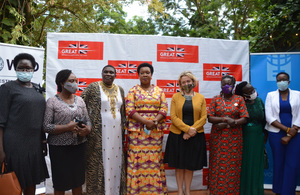Mentorship and Leadership programme for Ugandan Women Parliamentarians launched
The British High Commission, with CPA, WFD, UN Women and the UWOPA launched the second cohort of the mentorship programme for women parliamentarians in Uganda.

H.E. Kate Airey (C) British High Commissioner to Uganda poses with prominent females and partners of the women mentorship programme.
The one-year programme, which will be funded by the Commonwealth Parliamentary Association and supported by the British High Commission, was launched at a Women in Leadership networking event hosted by the UK High Commissioner to Uganda, H.E. Kate Airey OBE at the High Commissioner’s residence in Kampala. The event was attended by Ugandan women in key government positions, the business sector, NGO leaders, political party leaders and media practitioners.
The programme will target a second cohort of at least 35 female MPs, following a successful first cohort of 30 female parliamentarians, which will continue to run alongside. It is aimed at increasing the MP’s knowledge and skills in parliamentary practices and procedures, effective parliamentary scrutiny and external communication skills. The one-year programme will be implemented along three strands:
- one-to-one mentorship support programme between Ugandan and UK MPs
- senior leadership exchanges
- communications and parliamentary procedures workshop
It is hoped the programme will empower the beneficiary MPs to effectively carry out their parliamentary duties, as well as promote gender equality and the women in leadership agenda both in and outside parliament. The programme will build on similar programmes implemented by WFD, UN Women and CPA, UK in Uganda since 2017.
Speaking at the event the British High Commissioner to Uganda, H.E. Kate Airey OBE stated:
Women and girls represent half of the world’s population and therefore also half of its potential. But inequalities faced by women and girls begin at birth and continue into adulthood. I am delighted by the achievements Uganda has made so far to address gender inequality, with women now in 43% of local government positions 33% of parliamentary seats and 43% of the cabinet positions and a female Vice President and Prime Minister. But it took time to get here and there is still more to be done to promote gender equality in the UK, in Uganda and across the entire world. We must ensure that women are afforded the opportunities to take up leadership positions and that when they do they have the support they need. I hope this programme will help.
Jon Davies, CPA UK Chief Executive, said:
CPA UK is proud that Women in Parliament is one of our priority themes. CPA UK has consistently supported women parliamentarians across the Commonwealth through capacity-building programmes, multilateral conferences, and study visits. Ensuring women’s voices and experiences are included in parliamentary work has a clear positive impact on policy and scrutiny, and this programme will support women parliamentarians in effectively delivering their parliamentary responsibilities. Connecting women parliamentarians to share expertise and common challenges brings immense benefits, including promoting good practice and creating international support networks. CPA UK looks forward to this renewed collaboration with our friends and partners in Uganda.
Joseph Munyangabo, Westminster Foundation for Democracy Country Representative said:
Women’s political leadership results in better outcomes for women and girls, as well as for society as a whole, and delivers progress in policy areas vital for economic growth and development, such as health, education and infrastructure. Even without these quantifiable dividends, the argument for women’s empowerment is irrefutable – democracy cannot be said to exist if more than half of the population is not wholly engaged equally in decision-making. It is therefore critically important that we continue to invest in the mentorship of the brave women who have assumed political leadership in their communities to effectively carry out their mandate.
Ms. Adekemi Ndieli, UN Women’s Deputy Country Representative added:
When women come into leadership positions they face numerous challenges and their capacity to exercise leadership is strongly influenced by complex gender and political dynamics within and beyond the institutions in which they operate. Therefore, as UN Women we are strongly committed to supporting women as leaders to be effective in their work ensuring that decisions taken for the country are inclusive and reflect the needs of the entire country, especially the most vulnerable and those left behind in the development process. This mentoring project gives us an opportunity to enhance women’s leadership, representational and functional capability as well as their capacity to contribute to enhanced development outcomes.
In addition to the launch of the mentorship programme, the UK will also drive forward a new global convention to condemn the use of rape and sexual violence as weapons of war. As part of this, next year the UK will host a major global summit to unite the world to take action to prevent sexual violence in conflict. Women and girls are a top UK foreign policy priority and it is hoped that the £20 million pounds of new funding committed by the UK Foreign Secretary, to this initiative will go some way to help stop violence against women and girls around the world.